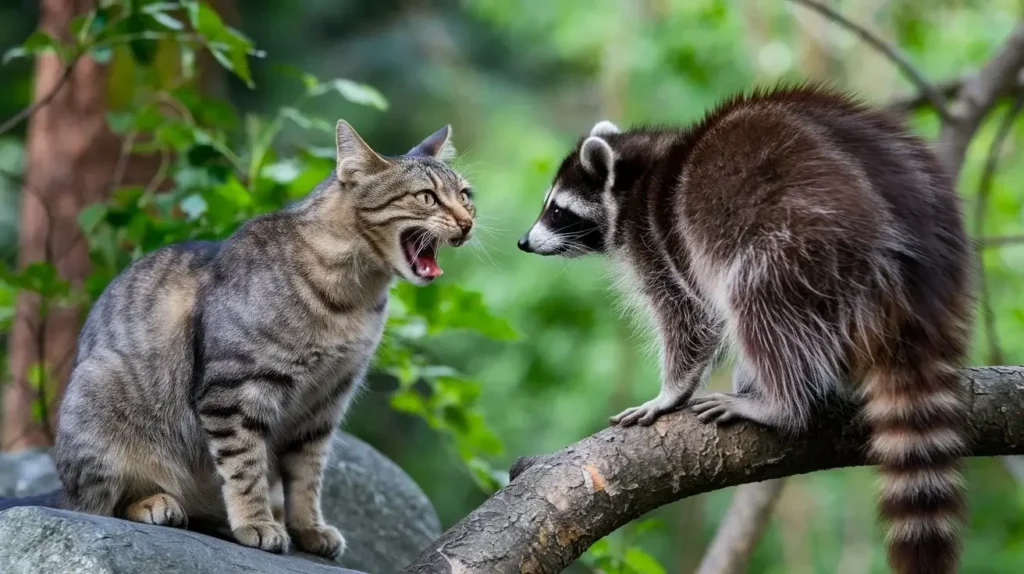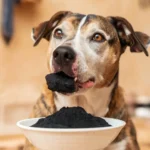In the intriguing realm of animal behavior, one question that often sparks curiosity is “do cats eat raccoons?” This fascinating query delves into the complex relationship between two of nature’s most adaptable creatures. As we explore this topic, we’ll uncover compelling insights into feline and raccoon behavior, their dietary habits, and the surprising ways these animals interact in both urban and rural environments.
The Natural Behaviors of Cats and Raccoons: Predator or Prey?
Feline Instincts: Do Cats Hunt Raccoons as Prey?
Cats, whether domesticated or feral, are undoubtedly natural-born predators. Their lithe bodies, sharp claws, and keen senses make them formidable hunters. However, when it comes to the question “do cats eat raccoons,” we must consider several important factors:
- Size difference: Most domestic cats are significantly smaller than adult raccoons, which can pose a challenge.
- Hunting preferences: Cats typically prefer smaller prey like rodents and birds, rather than larger animals.
- Territorial behavior: Cats may engage with raccoons more for territory defense than for food acquisition.
Raccoon Characteristics: Are Raccoons Cat Predators or Potential Meals?
The raccoon is an incredibly adaptable omnivore, recognizable due to its masked face and ringed tail. Their eating behavior will clarify the answer to the question, “do raccoons eat cats.”.
- Opportunistic feeders: Raccoons eat a wide variety of foods, including plants, small animals, and human food scraps.
- Nocturnal nature: Raccoons are primarily active at night, which can lead to unexpected encounters with outdoor cats.
- Urban adaptation: Both raccoons and cats have successfully adapted to urban environments, increasing the likelihood of interactions between the two species.
Do Cats Eat Raccoons? Examining the Evidence of Feline-Raccoon Encounters
When investigating whether cats eat raccoons, it’s essential to consider various scenarios and evidence that may shed light on this intriguing question:
Size and Strength Comparison: Can Cats Overpower Raccoons?
In most cases, the answer to “do cats eat raccoons” is no. Adult raccoons are typically larger and stronger than domestic cats, making them an unlikely prey choice. Nonetheless, it’s important to keep in mind a few exceptions:
- Feral cat colonies: Large groups of feral cats might occasionally target young or injured raccoons if the opportunity arises.
- Big cat species: While not common, larger wild cats like bobcats or lynx might prey on raccoons in certain habitats where their territories overlap.
Dietary Preferences and Hunting Behavior: What Do Cats Really Eat?
Cats are obligate carnivores, which means their diet must be predominantly made up of meat. However, their typical prey choices don’t usually include raccoons for several reasons:
- Preferred prey: Cats generally hunt smaller animals like mice, birds, and insects, which are easier to catch and subdue.
- Energy expenditure: Taking on a raccoon would require significant energy and risk, making it an inefficient hunting choice for most cats.
Raccoon Defense Mechanisms: How Do Raccoons Protect Themselves from Cats?
Raccoons have several traits that make them challenging prey for cats, further explaining why cats rarely, if ever, eat raccoons:
- Size advantage: Adult raccoons can weigh up to 20 pounds, much larger than the average house cat, giving them a defensive edge.
- Sharp claws and teeth: Raccoons are equipped with formidable natural weapons for self-defense against potential predators.
- Intelligence: Raccoons are known for their problem-solving abilities, which can help them avoid confrontations with cats and other animals.
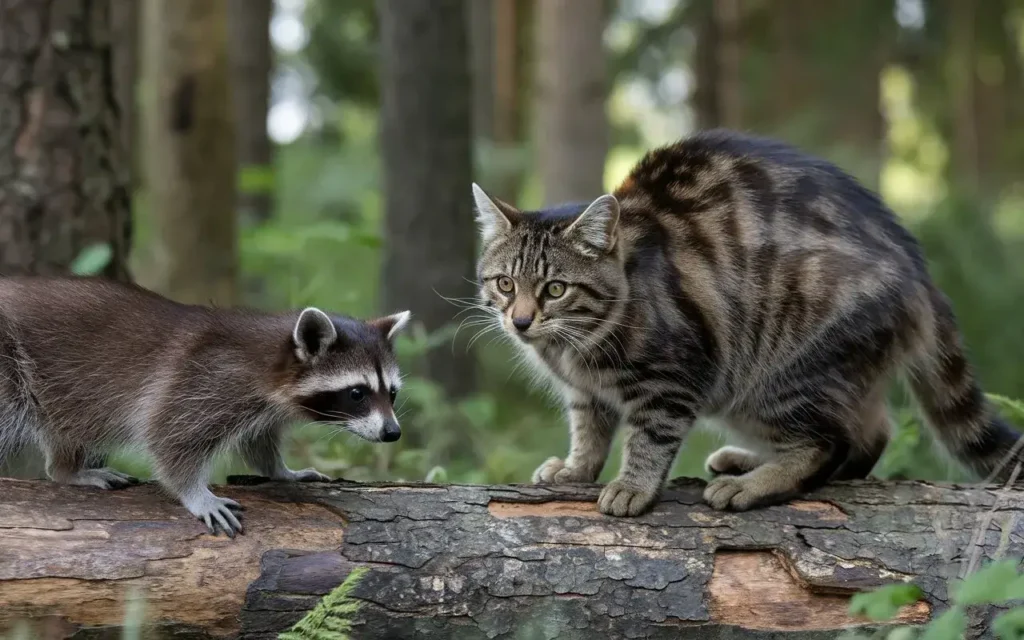
Do Raccoons Eat Cats? Exploring the Reverse Scenario of Animal Interactions
While we’ve focused on whether cats eat raccoons, it’s equally important to address the reverse question: “do raccoons eat cats?” This alternative scenario raises intriguing factors that illuminate the intricate connection between these two species:
Raccoon Dietary Habits: Are Cats on the Raccoon Menu?
Raccoons are omnivores with a diverse diet, but do they include cats in their culinary repertoire? Let’s examine the facts:
- Opportunistic feeding: Raccoons will eat almost anything they can find, including small mammals, but cats are not a typical prey item.
- Scavenging behavior: They’re more likely to eat carrion than to actively hunt cats, preferring easier food sources.
- Size limitations: Adult cats are generally too large for raccoons to consider as prey, making such encounters unlikely.
Instances of Raccoon Aggression: When Do Raccoons Attack Cats?
While rare, there have been reported cases of raccoon attacks on cats, which may lead some to wonder if raccoons eat cats. However, these incidents are usually related to other factors:
- Territorial disputes: Raccoons may become aggressive if they feel their territory is threatened by the presence of cats.
- Resource competition: Both species might clash over food sources, especially in urban areas where resources may be limited.
- Defense of young: Mother raccoons can be particularly aggressive when protecting their kits from perceived threats, including curious cats.
The Impact of Human Presence on Cat-Raccoon Interactions: Urban Wildlife Challenges
Human activity significantly influences the relationship between cats and raccoons, creating unique challenges in urban and suburban environments:
Urban Environments and Wildlife Encounters: Where Do Cats and Raccoons Meet?
As cities expand, both cats and raccoons have adapted to urban living, leading to more frequent interactions between the two species:
- Shared resources: Both animals may compete for food in garbage cans or outdoor pet bowls, increasing the likelihood of confrontations.
- Habitat overlap: Urban green spaces and residential areas provide shelter for both species, bringing them into closer proximity.
- Human intervention: People feeding outdoor cats or raccoons can alter natural behaviors and increase encounter rates between the two animals.
Pet Safety Concerns: How Can Cat Owners Protect Their Pets from Raccoons?
For cat owners, understanding the potential risks of raccoon encounters is crucial to ensuring the safety of their feline companions:
- Disease transmission: Raccoons can carry diseases like rabies, which pose a serious risk to cats if contact occurs.
- Injury potential: Even if raccoons don’t eat cats, physical confrontations can result in serious injuries for both animals.
- Preventive measures: Keeping cats indoors at night and securing outdoor food sources can significantly reduce the risk of negative interactions with raccoons.
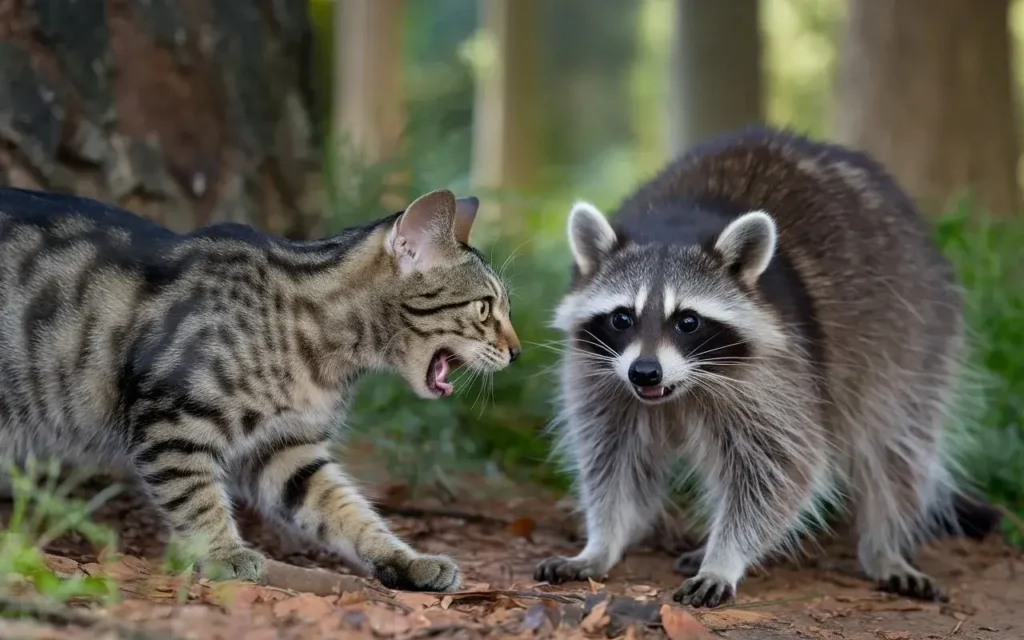
Do Raccoons Eat Cat Food? Understanding Feeding Behaviors and Pet Owner Challenges
All cat-raccoon interactions call for one important question in the minds of people having pets: “Do raccoons eat cat food?” The inquiry fundamentally pertains to effective wildlife management and the responsible care of pets.
Raccoon Foraging Habits: Why Is Cat Food Attractive to Raccoons?
Raccoons are notorious for their ability to access and consume a wide variety of food sources, including pet food left outdoors:
- Adaptability: Raccoons can easily open containers and manipulate objects to reach food, making outdoor pet food bowls an easy target.
- Nutritional needs: Cat food is high in protein and fat, making it an attractive and calorie-dense option for raccoons looking for an easy meal.
- Seasonal variations: Raccoons may be more likely to seek out cat food during times when natural food sources are scarce, such as in winter or during droughts.
Implications for Pet Owners: How to Prevent Raccoons from Eating Cat Food
Understanding that raccoons eat cat food can help pet owners take appropriate precautions to protect their pets and discourage wildlife intrusions:
- Feeding schedules: Avoid leaving cat food outdoors overnight when raccoons are most active to reduce the temptation.
- Secure storage: Keep pet food in sealed containers that raccoons can’t access to prevent theft and contamination.
- Indoor feeding: Consider feeding cats indoors to eliminate the temptation for raccoons and other wildlife to visit your property.
The Curious Case of Cat Poop: Do Raccoons Eat Cat Poop and Why?
In our exploration of feline-raccoon interactions, we must address an unusual but relevant question: “do raccoons eat cat poop?” While it may seem unpleasant, this topic provides valuable insights into animal behavior and potential health risks:
Raccoon Scavenging Behavior: Why Would Raccoons Eat Cat Feces?
Raccoons are known for their indiscriminate eating habits, which can include consuming feces of other animals:
- Nutritional content: Cat feces may contain undigested food particles that attract raccoons looking for an easy meal.
- Easy access: Outdoor litter boxes or buried cat waste in gardens can be easily found by raccoons with their keen sense of smell.
- Instinctive behavior: Raccoons naturally forage for a variety of food sources, including waste products, as part of their survival strategy.
Health and Sanitation Concerns: What Are the Risks of Raccoons Eating Cat Poop?
The consumption of cat poop by raccoons raises several health and sanitation issues that pet owners and wildlife managers should be aware of:
- Disease transmission: Parasites and bacteria in cat feces can be spread to raccoons and vice versa, creating a cycle of infection.
- Environmental contamination: Raccoons may scatter cat waste, spreading potential pathogens throughout the area.
- Pet health risks: Cats may be exposed to raccoon-borne diseases if they share outdoor spaces where contaminated feces are present.
As we’ve explored the questions of whether cats eat raccoons, if raccoons eat cats, and their various interactions, it’s clear that managing the coexistence of these species is important for urban ecology and pet safety:
Wildlife-Friendly Urban Planning: How Can Cities Accommodate Both Cats and Raccoons?
Cities can implement strategies to reduce conflicts between cats, raccoons, and humans, promoting a more harmonious coexistence:
- Green corridors: Creating connected green spaces allows wildlife to move without encroaching on residential areas, reducing potential conflicts.
- Proper waste management: Secure garbage containers and educate residents about not leaving food outdoors to minimize attractants for raccoons.
- Natural habitat preservation: Maintaining areas with native plants can provide natural food sources for raccoons, reducing their reliance on human-provided food.
Responsible Pet Ownership: What Can Cat Owners Do to Protect Their Pets and Wildlife?
Cat owners play a crucial role in minimizing negative interactions with raccoons and other wildlife:
- Indoor cats: Keeping cats indoors, especially at night, significantly reduces the risk of encounters with raccoons and other potential dangers.
- Supervised outdoor time: If cats go outside, supervise them or create enclosed “catios” for safe outdoor experiences without wildlife interactions.
- Regular veterinary care: Ensure cats are vaccinated and protected against diseases that can be transmitted by wildlife to maintain their health and safety.
Community Education and Awareness: How Can We Promote Harmony Between Cats and Raccoons?
Educating the public about cat and raccoon behavior can foster better coexistence and reduce conflicts:
- Wildlife appreciation: Promote understanding of the ecological roles of both cats and raccoons to increase empathy and tolerance.
- Conflict resolution: Provide resources for humane wildlife deterrent methods to help residents manage raccoon presence without harm.
- Reporting systems: Establish community networks for reporting and addressing wildlife concerns to quickly resolve potential issues.
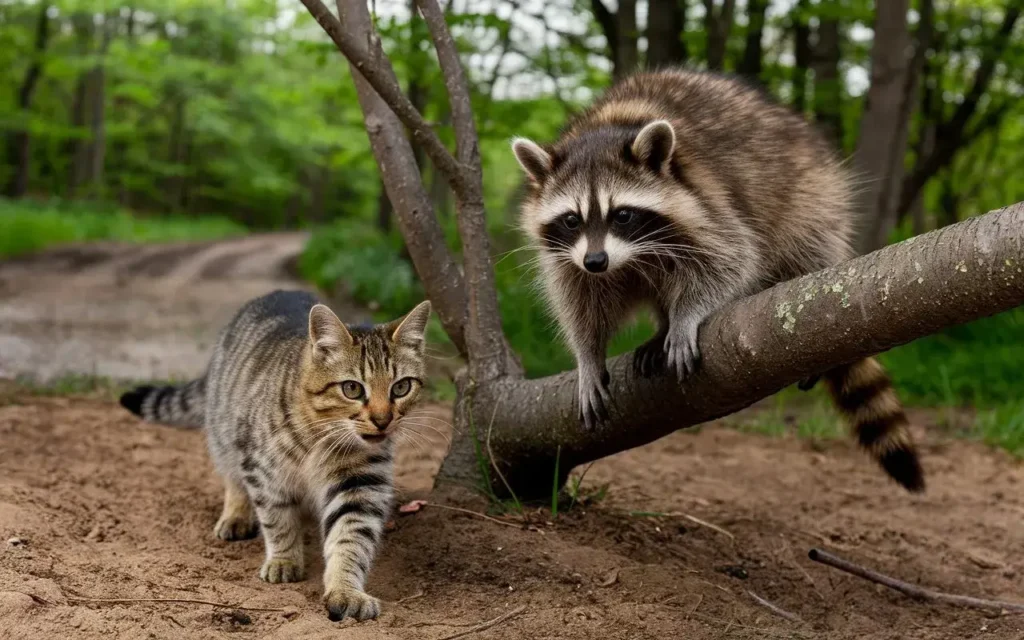
Conclusion: Understanding the Complex Relationship Between Cats and Raccoons
In answering the question “do cats eat raccoons,” we’ve uncovered a complex web of interactions between these adaptable animals. While it’s rare for cats to eat raccoons or vice versa, their paths often cross in ways that impact both species and the environments they share.
Key takeaways from our exploration include:
- Size and strength differences make it unlikely for cats to prey on raccoons, addressing the main question of whether cats eat raccoons.
- Raccoons may occasionally show aggression towards cats but rarely eat them, highlighting the complexity of their interactions.
- Both species compete for resources in urban environments, leading to potential conflicts that require management.
- Raccoons are attracted to cat food and may consume cat waste, raising health concerns for both animals and humans.
- Responsible pet ownership and wildlife management are crucial for harmonious coexistence between cats, raccoons, and humans.
This becomes important to help us in designing safer and balanced urban ecosystems, increasingly shared with a variety of wildlife. Showing respect to the needs of our pets and the wildlife will help keep an environment where cats and raccoons can coexist with minimal conflict.
Knowledge, whether you are an owner of a cat or a lover of wildlife, is of essence. Knowledge helps in the goodwill sharing of habitations. We can together ensure a safer environment for cats while respecting raccoons and other wildlife.

